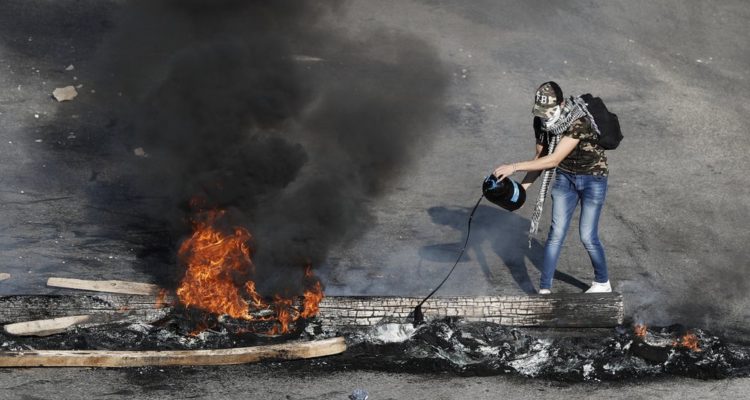Samer al-Khoury, a 29-year-old protester, said the protesters were giving the politicians 48 hours to form a new government.
By Associated Press
Following a brief lull, Lebanese protesters returned to the streets, blocking several roads around the capital, Beirut, and other areas of the country on Tuesday in renewed rallies against a ruling elite they say has failed to address the economy’s downward spiral.
Protesters burned tires and blocked three main highways leading to the capital from the south, east, and north, bringing traffic to a standstill. School and university students took part in some of the protests and hundreds marched down main highways, raising Lebanese flags and blasting rallying songs through loudspeakers.
The protesters returned to the streets after several weeks of relative calm, following the designation of Hassan Diab as prime minister in mid-December. The lull was also partly due to the holidays followed by soaring regional tensions between the U.S. and Iran that eclipsed the protesters in Lebanon and Iraq demanding sweeping political change.
Samer al-Khoury, a 29-year-old protester, said the protesters were giving the politicians 48 hours to form a new government.
“We need solutions,” he said. “The street is angry because some people are more poor than others; some people are dying in hospitals; some people don’t have food on their table.”
Rabie al-Zain, an activist protesting in Jal el-Dib, north of Beirut, said the rallies are a reminder to the rulers that the reasons for their protests are still here. “Today we add the students to the revolution — those who will handle the country when the current rulers will go to the dustbin of history,” he said.
In downtown Beirut, dozens rallied outside the Central Bank, chanting against the governor and his financial policies. Security forces separated the protesters from the bank’s entrance.
In the northern city of Tripoli and in Akkar province, protesters sat in the streets and blocked several roads with burning tires or bricks. In the southern city of Sidon, dozens of protesters marched down the streets, rallying outside banks and government offices.
Lebanon is facing its worst economic crisis in decades, with the local currency plummeting against the dollar, losing over 60% of its value over the last weeks while sources of foreign currency have dried up. Meanwhile, banks have imposed informal capital controls limiting withdrawal of dollars and foreign transfers in the country, which relies heavily on imports of basic goods.
Panic has set in among residents who fear their deposits are in danger. Nationwide protests for three months have failed to pressure politicians to form a new government to institute drastic reforms.
Diab, the designated prime minister, has so far failed to form an emergency government amid political divisions and jockeying for power. Prime Minister Saad Hariri resigned in late October.
Speaking to foreign diplomats, President Michel Aoun said Tuesday that forming a government in these critical times requires “people who can earn the trust of the people and the parliament.”
Lately, protesters had focused their ire on banks, rallying at the premises or outside banks and demanding access to their deposits. Dozens have also taunted politicians who showed up in shopping malls or restaurants, sometimes chasing them out of public places and decrying their failure to address the economic crisis.
Nationwide protests began in mid-October in Lebanon, denouncing years of government mismanagement and corruption, demanding the political elite step down.





